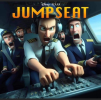One of his friends posted this on Facebook. I thought it was worth pasting here...
"""
Joe Emerson is a friend and a mentor to me. The events that took place have been gutting, and shocking to everyone that knows Joe, and of course troubling to his co-workers, the airline industry, and the traveling public. While I am not excusing or ignoring his actions, I want everyone to know just how special he is, and how respected he is by so many people. Joe has been in aviation for a long time and has been vital to countless departments at Horizon, Virgin America, and eventually Alaska Airlines. Joe is a husband, a father, a coach, a friend, one helluva pilot, an extremely knowledgeable instructor, and so much more.
The aviation industry can be a tough road to navigate sometimes. There is no room for mistakes as a Commercial Airline Pilot. The stress and pressures both imposed externally, and internally that we put on ourselves, can often become overwhelming, and this is on top of all the other pressures we face in life. It isn’t easy to raise your hand and ask for help in this industry. You can’t simply be put on anti-depressants or self-medicate like most of the public can. Pilots constantly fear that a medical issue, whether it be mental or physical, will bring their FAA medical into question, or worse yet, end their career.
We are in the infancy stage of addressing mental health issues in this country. Therapy is stigmatized. We don’t look to fix the root cause of mental health problems, we simply shove feelings and issues down and ignore problems until they reach a fever pitch, and it causes people to break. Everyone has a limit, and it causes wonderful people to temporarily lose their way. Joe is a fantastic human, and it sounds like he was dealing with personal issues that came to a head. Great people can make bad mistakes. Joe is not a monster. He is a man who loves his wife and kids, his friends and family, and flying airplanes.
I urge everyone to offer some thought and compassion when thinking about this challenging and complex situation…
"""







